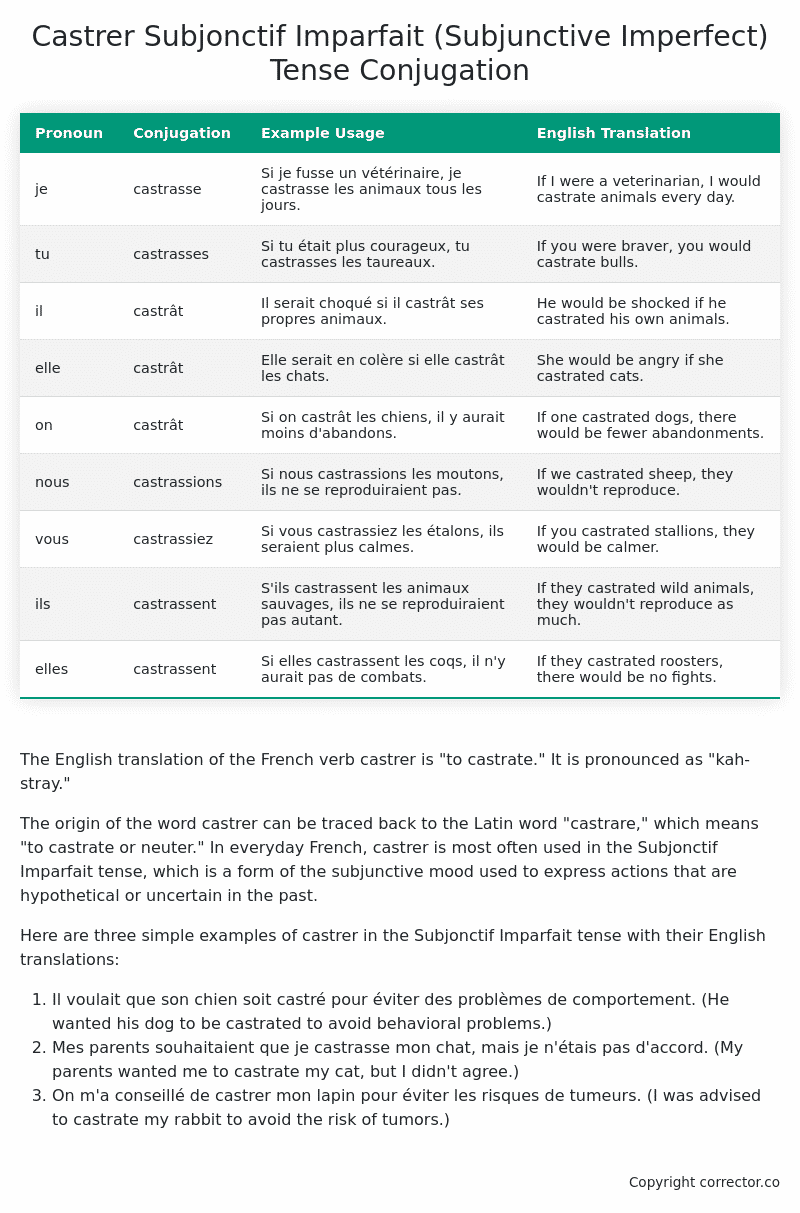Subjonctif Imparfait (Subjunctive Imperfect) Tense Conjugation of the French Verb castrer
Introduction to the verb castrer
The English translation of the French verb castrer is “to castrate.” It is pronounced as “kah-stray.”
The origin of the word castrer can be traced back to the Latin word “castrare,” which means “to castrate or neuter.” In everyday French, castrer is most often used in the Subjonctif Imparfait tense, which is a form of the subjunctive mood used to express actions that are hypothetical or uncertain in the past.
Here are three simple examples of castrer in the Subjonctif Imparfait tense with their English translations:
- Il voulait que son chien soit castré pour éviter des problèmes de comportement. (He wanted his dog to be castrated to avoid behavioral problems.)
- Mes parents souhaitaient que je castrasse mon chat, mais je n’étais pas d’accord. (My parents wanted me to castrate my cat, but I didn’t agree.)
- On m’a conseillé de castrer mon lapin pour éviter les risques de tumeurs. (I was advised to castrate my rabbit to avoid the risk of tumors.)
Table of the Subjonctif Imparfait (Subjunctive Imperfect) Tense Conjugation of castrer
| Pronoun | Conjugation | Example Usage | English Translation |
|---|---|---|---|
| je | castrasse | Si je fusse un vétérinaire, je castrasse les animaux tous les jours. | If I were a veterinarian, I would castrate animals every day. |
| tu | castrasses | Si tu était plus courageux, tu castrasses les taureaux. | If you were braver, you would castrate bulls. |
| il | castrât | Il serait choqué si il castrât ses propres animaux. | He would be shocked if he castrated his own animals. |
| elle | castrât | Elle serait en colère si elle castrât les chats. | She would be angry if she castrated cats. |
| on | castrât | Si on castrât les chiens, il y aurait moins d’abandons. | If one castrated dogs, there would be fewer abandonments. |
| nous | castrassions | Si nous castrassions les moutons, ils ne se reproduiraient pas. | If we castrated sheep, they wouldn’t reproduce. |
| vous | castrassiez | Si vous castrassiez les étalons, ils seraient plus calmes. | If you castrated stallions, they would be calmer. |
| ils | castrassent | S’ils castrassent les animaux sauvages, ils ne se reproduiraient pas autant. | If they castrated wild animals, they wouldn’t reproduce as much. |
| elles | castrassent | Si elles castrassent les coqs, il n’y aurait pas de combats. | If they castrated roosters, there would be no fights. |
Other Conjugations for Castrer.
Le Present (Present Tense) Conjugation of the French Verb castrer
Imparfait (Imperfect) Tense Conjugation of the French Verb castrer
Passé Simple (Simple Past) Tense Conjugation of the French Verb castrer
Passé Composé (Present Perfect) Tense Conjugation of the French Verb castrer
Futur Simple (Simple Future) Tense Conjugation of the French Verb castrer
Futur Proche (Near Future) Tense Conjugation of the French Verb castrer
Plus-que-parfait (Pluperfect) Tense Conjugation of the French Verb castrer
Passé Antérieur (Past Anterior) Tense Conjugation of the French Verb castrer
Futur Antérieur (Future Anterior) Tense Conjugation of the French Verb castrer
Subjonctif Présent (Subjunctive Present) Tense Conjugation of the French Verb castrer
Subjonctif Passé (Subjunctive Past) Tense Conjugation of the French Verb castrer
Subjonctif Imparfait (Subjunctive Imperfect) Tense Conjugation of the French Verb castrer (this article)
Subjonctif Plus-que-parfait (Subjunctive Pluperfect) Tense Conjugation of the French Verb castrer
Conditionnel Présent (Conditional Present) Tense Conjugation of the French Verb castrer
Conditionnel Passé (Conditional Past) Tense Conjugation of the French Verb castrer
L’impératif Présent (Imperative Present) Tense Conjugation of the French Verb castrer
L’infinitif Présent (Infinitive Present) Tense Conjugation of the French Verb castrer
Struggling with French verbs or the language in general? Why not use our free French Grammar Checker – no registration required!
Get a FREE Download Study Sheet of this Conjugation 🔥
Simply right click the image below, click “save image” and get your free reference for the castrer Subjonctif Imparfait tense conjugation!

Castrer – About the French Subjonctif Imparfait (Subjunctive Imperfect) Tense
Formation
Common Everyday Usage Patterns
Interactions with Other Tenses
Subjonctif Présent
Indicatif Passé Composé
Conditional
Conditional Perfect
Summary
I hope you enjoyed this article on the verb castrer. Still in a learning mood? Check out another TOTALLY random French verb conjugation!


